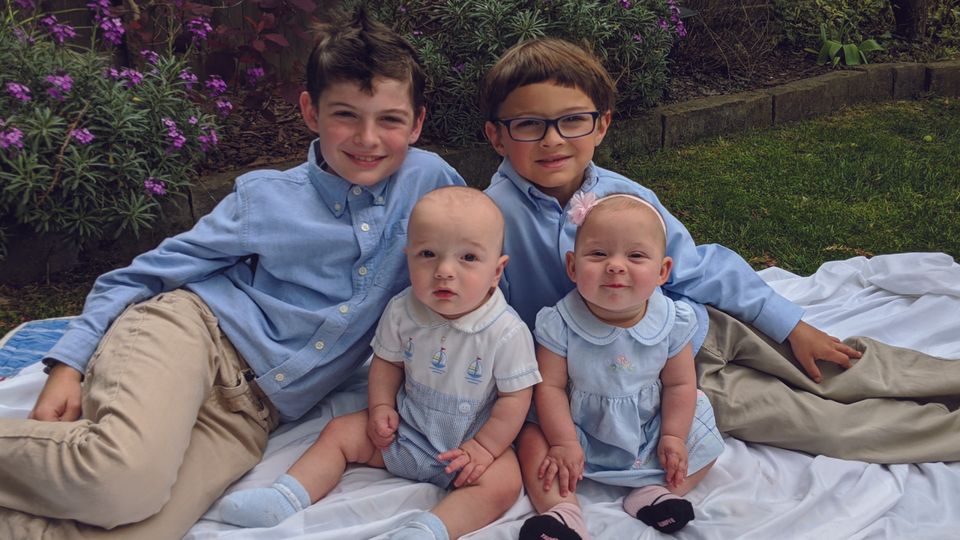When Estate Planning gets Personal: The Pot Trust
Quinton J. Miller • October 12, 2020

One year ago my wife and I were blessed with quadruplets. We kept two, and we lost two. This is the third in a series of blog posts addressing our experience from an estate planning perspective.
Most people want to leave their assets to their children in equal shares. This is the default distribution specified by the probate code, and in general it’s a fair and equitable way to do things. There are instances, however, when what is fair is not equitable.
In our case, we were facing a situation where eight to ten years would separate our oldest two children from the newcomers. Suppose we were to both pass ten years from now leaving an estate of $600,000, working out to $100,000 per child. Our eldest, at 20, would immediately have $100,000 to apply to college and other expenses. Our youngest would also start off with $100,000 each, which would pay for living expenses, sports, medical, etc. By the time they reached the age of 20, their share would be depleted to say, $50,000.
In other words, while each child would technically receive the same inheritance, at age 20 the youngest children would receive half as much as their elder brother.
The way to avoid this outcome is to use what is commonly called a “pot trust”. You may sometimes hear it referred to as a sprinkling trust or even a spray trust. The basic idea is that instead of making an immediate division of trust assets at the time of death, a portion of the overall trust is set aside for the “pot”, to be used indiscriminately for the benefit of minor children. Once the youngest child comes of age or reaches a specified age, the remaining “pot” is divided among all of the children.
This ensures that minor children get provided for from the general estate and makes it more likely that all children will receive the same amount at adulthood.
With quadruplets on the way, the distribution plan we’d originally set up was clearly deficient. We ultimately allocated about half of our estate to a pot trust, not to be divided until our youngest child turned 18. This meant that our eldest son would have ample funds to pay for his education and start life, but wouldn’t receive the balance of his inheritance until age 28 when his youngest sibling turned 18. More importantly, it ensured that all our children would enter adulthood with a similar inheritance, regardless of their age.
Fair? Equitable? This is the plan that made the most sense to us in our situation. Whether it makes sense for you depends upon your unique circumstances. No plan fits all sizes, but our growing size made this plan make sense.
Till next time, call us before you need us.
The Law Office of Quinton J. Miller
is a general practice law firm with an emphasis on Estate Planning and serves clients throughout Sacramento and Northern California. We assist clients with estate and long term care planning, and small businesses with transition planning, litigation, and general business needs. For more information or to schedule a consultation, please contact us at (916) 714-1717
or visit our website at www.QuintonLaw.com.

One year ago my wife and I had quadruplets. We kept two, and we lost two. This is the second in a series of blogs addressing our experience from an estate planning perspective. When you can’t afford something, you insure against it. Like most young families in our stage of life, we couldn’t make it financially without my income. Which is where life insurance comes in. When we learned about the quads, our policy coverage was one of the first things we revisited. How much life insurance should you have? If collecting would feel like winning the lottery, you have too much! For a growing family, life insurance should function as a stop-gap measure until the kids are grown and the surviving spouse is able to return to work. When calculating the coverage you need, don’t just count the face value of the policy. Instead, also consider the income the policy should be expected to generate if invested conservatively. For example, a million dollars earning 3% a year will yield an annual income of $30,000. Before this, with only two children, we’d always assumed that if I was left alone I would still be able to work, at least part time. Accordingly, the policy on my life was double that of my wife’s policy. With quads, this analysis changed radically! If something happened to her, I would be left raising six young children on my own, effectively in early retirement. In the end, we doubled her policy, and modestly increased mine. Our choices were based in part on our living expenses, what was left of our mortgage, and what I expected would be left after 20 years of raising six children. Insurance is a critical part of any estate plan, particularly when young children are part of the equation. How it intersects with your trust will be the subject of my next post. Till next time, call us before you need us.

As a rule, an estate planning practice is an impersonal thing. Clients come in, I identify their needs and prepare a plan to address them. But over the past year, our estate plan got personal. In November of 2018 we learned that my wife was pregnant. In December we learned that we were having triplets. And in January…they found another one. In late May, at about 30 weeks gestation, the reality of four babies packed inside set in. A Saturday night checkup revealed no problems other than a lot of discomfort for my wife. By Monday morning, two heart beats had stopped. Later analysis revealed that the placentas had separated from the wall of the uterus, for no particular reason other than that it was just really crowded. An emergency C-Section later we had two beautiful babies; two in our arms, and two in heaven. Over the course of the pregnancy there was a tremendous amount of psyching ourselves up for the heroic task of raising quadruplets. We reorganized our home and altered our lifestyles. I lost 30 pounds. Our church and community rallied around us. Significantly, we also revisited our estate plan. Over the next few weeks I’m going to issue a number of posts exploring why we did so, what we looked at, and what changes we made. I’m also going to look at how this all relates to the average estate planning client. Our needs were obviously unique, but the process and reasoning behind the choices we made are relevant to everyone. Till next time, call us before you need us.

On March 18, 2020, the Sacramento Superior Court went dark. Along with the rest of California, they closed their doors to help slow the spread of COVID-19. At present they’re still dark and will be at least through May 15. In this post I’d like to discuss briefly what this means for attorneys like myself, and secondly what it means for you.

The past few weeks have introduced America to a whole new era. I never thought I would have to stand in line at the grocery store waiting to get in. Or be grateful for that extra bag of toilet paper on the top shelf. Or see signs on every playground banning the use of play structures. The coronavirus has upended everything we thought was normal.

